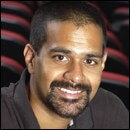News
CAMBRIDGE, Mass. - January 29, 2008 -- Vinothan N. Manoharan, Assistant Professor of Physics and Chemical Engineering in the Harvard School of Engineering and Applied Sciences (SEAS) and Department of Physics, has won a Faculty Early Career Development (CAREER) award from the National Science Foundation (NSF). The honor is considered one of the most prestigious ways to recognize rising stars in science and engineering.
Manoharan's research explores light scattering, optical microscopy, spectroscopy, synthesis and other experimental techniques to understand the physics of self-organization. For most of these experiments his lab uses colloids, suspensions of particles typically about a micrometer in size.
"The NSF grant will support research on how very simple systems of micro- or nano-particles can assemble themselves into ordered structures," says Manoharan. "If we can understand how these systems self-assemble, we might be able to control the process in order to build new kinds of optical materials and photonic devices. More generally, we're hoping to figure out the physical 'rules' for making nanoscale materials through self-assembly."
The particles used by his lab are suspended in a fluid and are small enough so that they move randomly (i.e., Brownian motion). Even though the motion is random, under some conditions the particles can organize into an ordered structure, like a crystal or, for a small number of particles, a cluster or polyhedron.
"We are looking at this process using a relatively new experimental technique called Digital Holographic Microscopy. This is a digital version of the holographic photography originally done by Gabor in the 1950's. The technique allows us to capture a single 2D image (the hologram) that tells us about the entire 3D structure of the sample. In 2 milliseconds we can locate the instantaneous position of all the particles with 10-nanometer precision, and we can watch in real-time as they self-assemble. This is very difficult to do with ordinary microscopy," he says.
Manoharan anticipates that the main hurdles to overcome are storing and processing the vast amount of data that is generated in the simple experiments. Thus, he is closely working with Joy Sircar, Associate Dean for IT and CIO at SEAS, and other members of the SEAS IT team on the project. Manoharan's lab is also collaborating with other industry and academic partners, including AMD/ATI, who have donated computer hardware and software support, and the Barbastathis group at MIT, responsible for developing some of the holographic techniques they are using.
With help from SEAS Director of Educational Programs, Kathryn Hollar, the grant will also support an outreach program in science and enginering with the Kennedy-Longfellow School in Cambridge, Massachusetts. Several Harvard undergraduate and graduate students will work to engage eighth-graders in "inquiry-guided" learning, encouraging the students to test their understanding of basic engineering design principles.
Prior to his arrival at Harvard, Manoharan was a Postdoctoral Fellow in the Department of Chemical and Biomolecular Engineering at the University of Pennsylvania. He received his B.S.E. from Princeton University (1996) and his Ph.D. from the University of California, Santa Barbara (2004).
###
About the Faculty Early Career Development (CAREER) Program
The Faculty Early Career Development (CAREER) Program is a Foundation-wide activity that offers the National Science Foundation's most prestigious awards in support of the early career-development activities of those teacher-scholars who most effectively integrate research and education within the context of the mission of their organization. Such activities should build a firm foundation for a lifetime of integrated contributions to research and education. NSF encourages submission of CAREER proposals from junior faculty members at all CAREER-eligible organizations and especially encourages women, members of underrepresented minority groups, and persons with disabilities to apply.
Cutting-edge science delivered direct to your inbox.
Join the Harvard SEAS mailing list.
